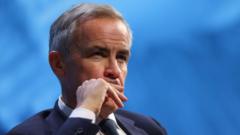In light of Justin Trudeau's announcement to step down after nearly a decade, former central banker Mark Carney has revealed he is "considering" a bid to lead Canada's Liberal Party. Pressure from within the party, combined with a decline in opinion polling, prompted Trudeau to announce his departure, stating he will remain in office until a successor is named.
Mark Carney Weighs Run for Leadership of Canada's Liberal Party

Mark Carney Weighs Run for Leadership of Canada's Liberal Party
Former Bank of Canada Governor Mark Carney expresses interest in succeeding Justin Trudeau as Liberal leader following Trudeau's announcement to resign.
Following his tenure leading both the Bank of Canada and the Bank of England, Carney, 59, has emerged as a prominent contender for the position. He expressed in an interview with the Financial Times that he is weighing his options carefully alongside family. Despite a distinguished economic career, Carney has yet to hold public office, raising questions about his political viability.
The process of selecting Trudeau’s replacement is still unclear, with the Liberal Party aiming to finalize a new leader by the end of the prorogation period for Parliament on March 24. Other potential candidates include Chrystia Freeland, Trudeau's former deputy, and Transport Minister Anita Anand.
As Carney considers a leadership bid, the political landscape remains challenging. Canada is due for a federal election by October, with some speculation that it may occur sooner, especially as the opposition Conservative Party, under Pierre Poilievre, currently enjoys a commanding lead in polls. Carney’s extensive experience in finance and climate policy could play a pivotal role in shaping the Liberal Party's direction moving forward.
The upcoming leadership transition represents a significant moment in Canadian politics and Carney's expertise in addressing economic and environmental issues could be critical as the nation seeks to navigate its next chapter post-Trudeau.
The process of selecting Trudeau’s replacement is still unclear, with the Liberal Party aiming to finalize a new leader by the end of the prorogation period for Parliament on March 24. Other potential candidates include Chrystia Freeland, Trudeau's former deputy, and Transport Minister Anita Anand.
As Carney considers a leadership bid, the political landscape remains challenging. Canada is due for a federal election by October, with some speculation that it may occur sooner, especially as the opposition Conservative Party, under Pierre Poilievre, currently enjoys a commanding lead in polls. Carney’s extensive experience in finance and climate policy could play a pivotal role in shaping the Liberal Party's direction moving forward.
The upcoming leadership transition represents a significant moment in Canadian politics and Carney's expertise in addressing economic and environmental issues could be critical as the nation seeks to navigate its next chapter post-Trudeau.



















